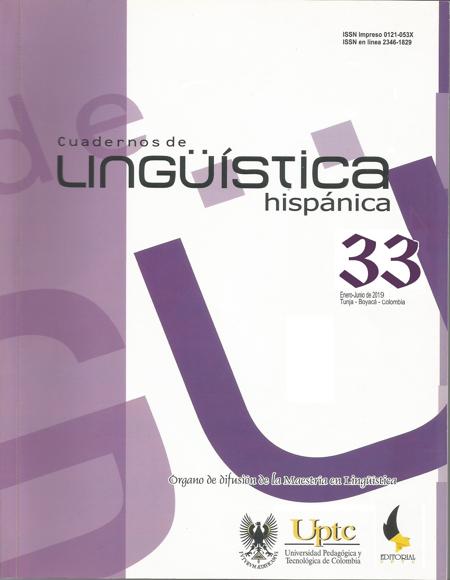Discursive Strategies for the Social Construction in the Post-Conflict Era (2015-2017)

Abstract
The objective is to analyze the linguistic and rhetorical resources used in the discursive construction about the social actors of the post-conflict, through the study of nine editorials of the newspaper El Espectador, between the years 2015-2017. The research is woven from the perspective of Critical Discourse Analysis (CDA), in order to make a theoretical formulation about journalistic discursive manifestations and a critical reflection on the social realities of journalistic language. The methodology was developed in two stages: an exploratory-descriptive and an analytical one. In the first, a compilation of the editorials under study is made to be submitted to the qualitative analysis program NVivo 11, reporting significant elements such as the frequency of words, co-texts, and the cloud mark and the conglomerates. The second involved the realization of a linguistic analysis to interpret the strategies of legitimation, naturalization and concealment used to discursively construct the social actors of the post-conflict.
Keywords
critical discourse analysis, postconflict, social actors, language, press, Colombia
References
Calsamiglia, H. & Tusón, A. (2002). Las cosas del decir. Manual de análisis del discurso. Barcelona: Ariel.
Charaudeau, P. (2003). El discurso de la información. La construcción del espejo social. Barcelona: Gedisa.
Cruz, C.N. (2016). El enfoque de legitimación y dinámica política (LDP) como propuesta para el estudio de la estabilidad y el cambio de las políticas públicas. (Tesis doctoral). Universidad Complutense de Madrid, España.
Hernández, N. (2015). La construcción mediática de perdedores y vencedores en el campo político: análisis de las metáforas, tópicos y lexicalización. Cuadernos de Lingüística Hispánica, (25), 81-98. doi: http://dx.doi.org/10.19053/ 0121053X.3479
Molina, J. (2009). La representación social del fenómeno del desplazamiento forzado en la prensa colombiana. Universitas Humanística, 67, 127-146.
Pardo, N. G (2007). Cómo hacer análisis crítico del discurso. Una perspectiva latinoamericana. Recuperado de http://www.bdigital.unal.edu.co/10250/1/C%C3%B3mo%20hacer %20ACD.pdf
Prieto, C. D. (1999). El juego del discurso. Manual de análisis de estrategias discursivas. Buenos Aires: Lumen Hvmanitas.
Serrano, S. & Villalobos, J. (2008). Las estrategias argumentativas en textos escritos por estudiantes de formación docente. Letras, 77(50), 76–102.
Tibatá H. & Torres, D. (2018). Communicative Interaction for the Construction of the Wasteland in Postconflict’s Colombia. Asian Journal of Humanities and Social Studies, 6(2), 60-72. https://doi.org/10.24203/ajhss.v6i2.5271
Van Leeuwen, T (1996). The representation of social actors in discourse. In C. R. Coldas-Coulthard & M.
Coulthard, (ed.), Texts and practices: Readings in critical discourse analysis (pp.32-70). London: Routledge.
Van Dijk, T. A. (1995). Discourse Analysis as Ideology Analysis. In C. Schäffner & A. Wenden (ed.), Language and Peace (pp. 17-36). Amsterdam: Harwood Academic Publishers.
Van Dijk, T. A (1999). El análisis crítico del discurso. Barcelona: Anthropos.
Van Dijk, T. A. (2003). Ideología y discurso. Una introducción multidisciplinaria. Barcelona: Ariel.
Van Dijk, T. A. (2009). Discurso y poder. Barcelona: Gedisa.
Wodak, R. & Meyer, M. (2003). Métodos del análisis crítico del discurso. Barcelona: Gedisa.